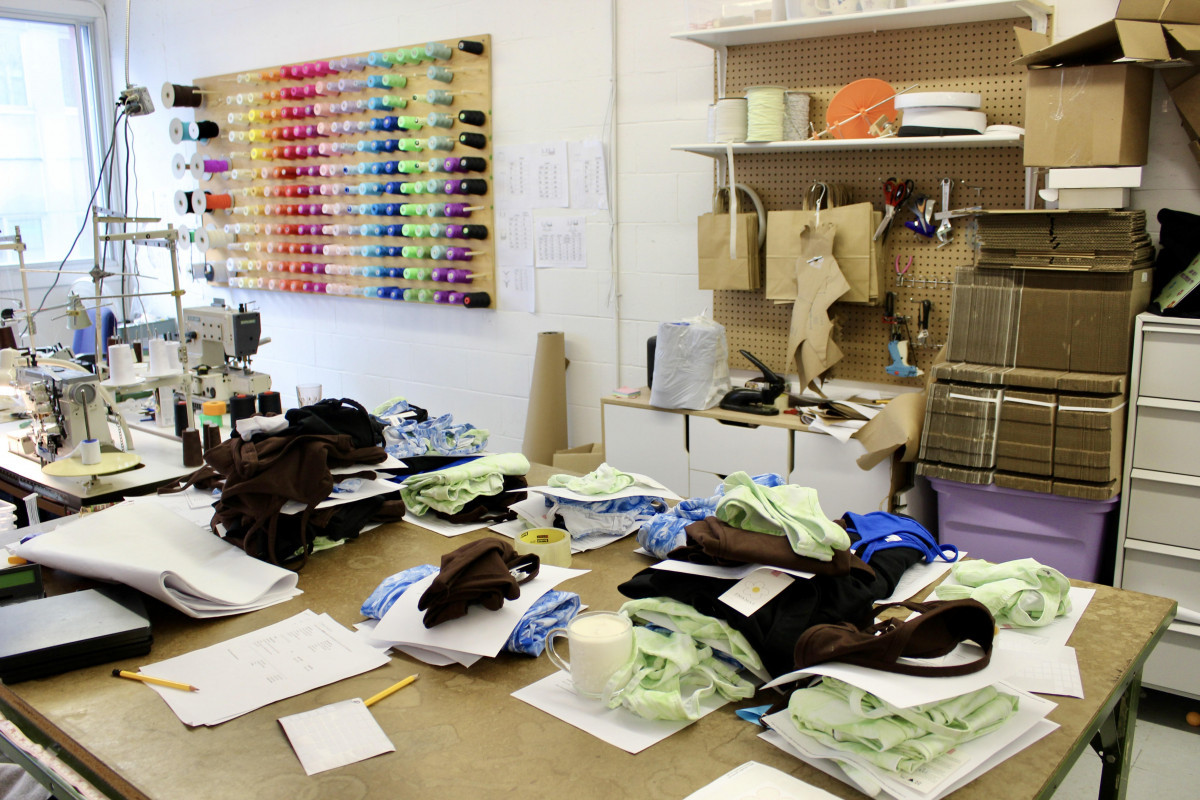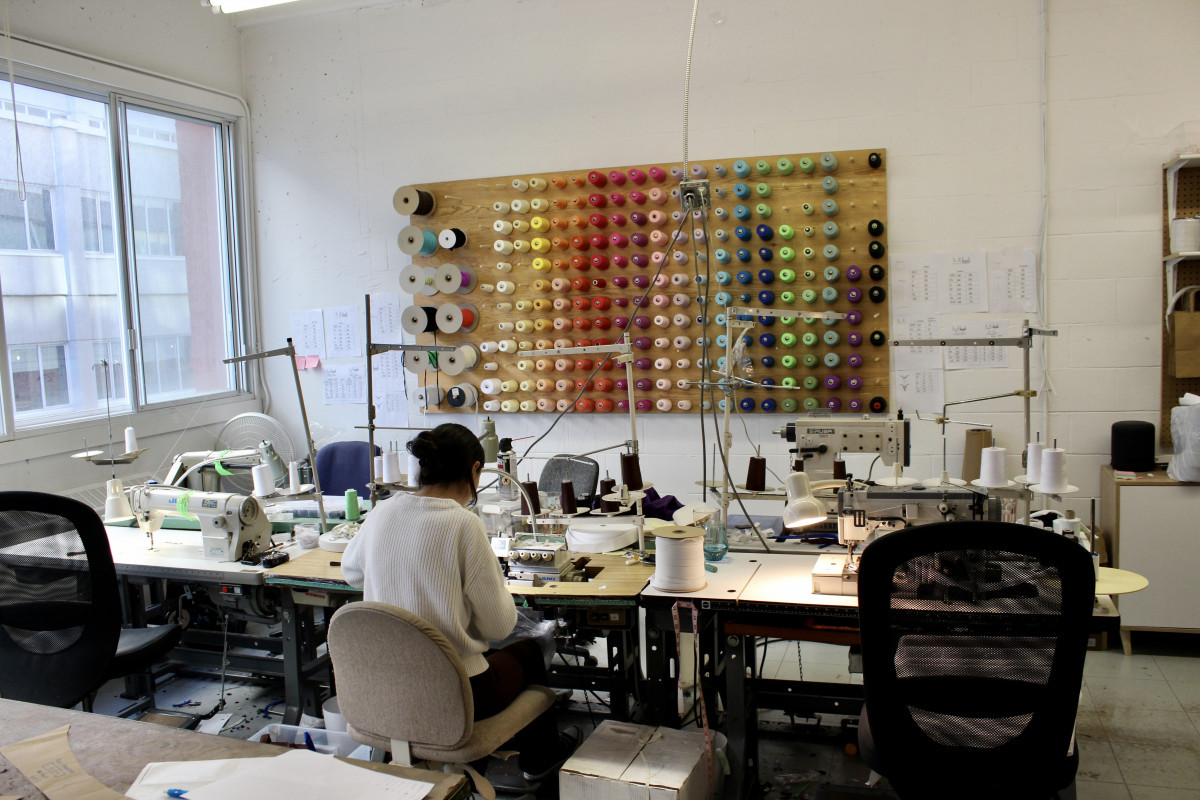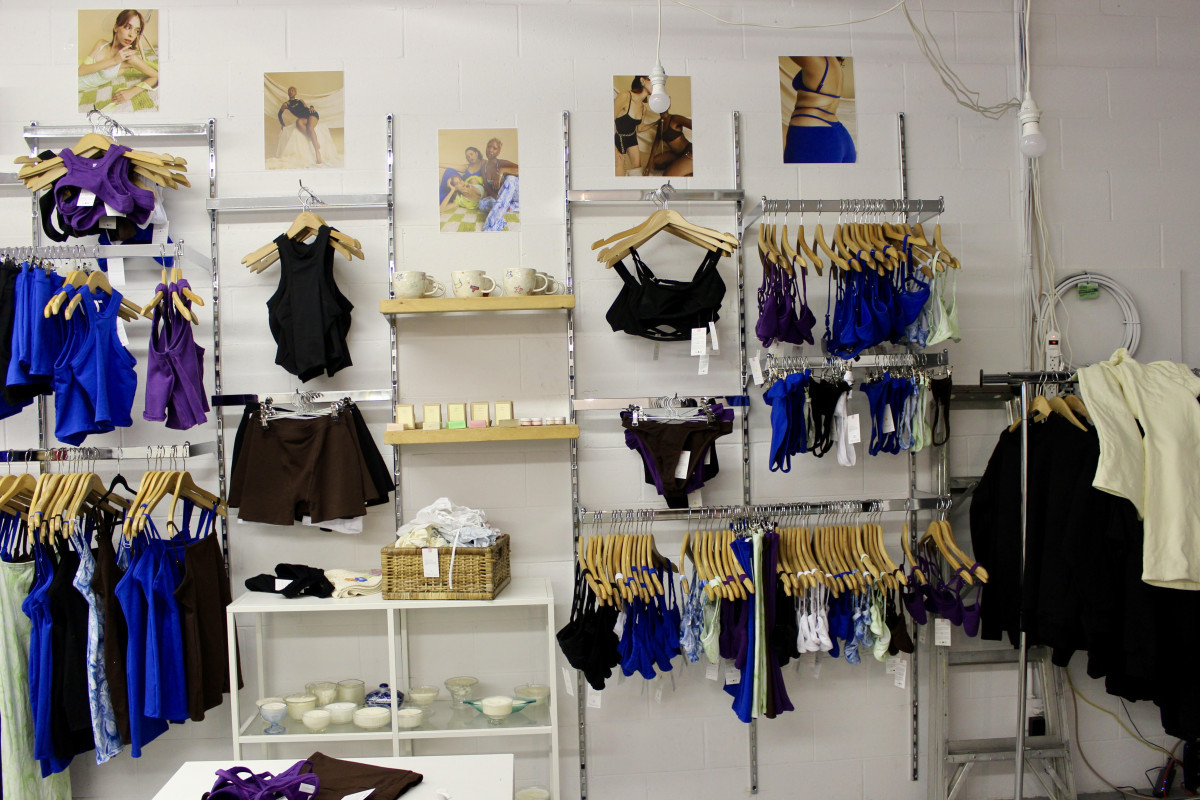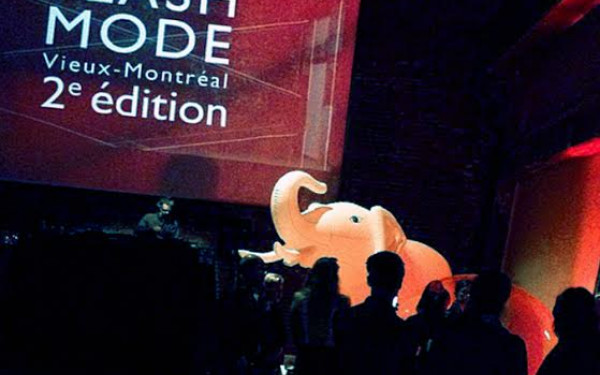Meet Montreal-based clothing brand Em & May
Discover this local shop with a sustainable business model and extended sizing! Photo Talia Kliot
Made to order and sustainably made
When Emilie Pittman was growing up, her favourite activity was shopping. Her grandmother would hand her a $100 bill and let her run around the mall, letting her try on various adult outfits and choose whatever she liked.
“I think that inspired me to want to be around clothes,” said Pittman, who’s 25 now, from a vintage zebra-print chair in the Plateau studio of her clothing company, Em & May. “Making my own stuff was just the best outcome, really.”
Named after her French bulldog and “soul sister” May, Pittman’s brand creates sustainable intimates, swimsuits, and loungewear, and curates vintage clothing.
Pittman’s designs are practical, comfortable, and creative, putting her own spin on basics and offering a wide range of colours, from bright oranges to more muted whites.
Em & May follows a made-to-order business model, which reduces waste and offers opportunities for extensive size charts and custom sizing. Pittman explained that made-to-order means she only produces the amount of pieces that were ordered, ensuring that there aren’t extra or unwanted garments. She also noted that because bigger brands need to predict how many of each size they’re going to sell, they reduce the amount of sizes they offer to save money—the fewer they produce, the fewer they are unable to sell. Because of the made-to-order method of production, Em & May is now able to offer 18 different sizes to her clientele, increased from the original 15, as well as custom ones for those who need them.

Most of Em & May merchandise is sold online or at pop-up shops in the studio, and a few pieces can be found in a few local stores, such as Station Service on St. Laurent Blvd. and Betina Lou on Henri-Julien Ave.
Pittman sources all her fabrics sustainably, either buying from certified sustainable companies or using deadstock, meaning leftover fabric or pieces that didn’t sell from other clothing brands. “It’s really hard to find sustainable fabrics that are actually sustainable and not a million dollars,” she explained. Yet, she is committed to staying true to her ethical practices without sacrificing affordability, with her prices ranging from around $22 to $30 for underwear, $80 for a bundle of a brief and a bra, and $100 for a bathing suit set.
Pittman’s other sustainability practices include use of only recycled materials for packaging and giving scraps of fabric that cannot be used to local designers who are experimenting with patchwork.
Originally from Newfoundland, Pittman started Em & May while still a student of fashion design at LaSalle College to make some extra money. After class, she would spend long hours at school making garments to sell on a Facebook page.
From there, the page grew, the orders increased, and a website was launched. Pittman explained that in February 2020, Em & May became a full-time endeavour as she started releasing consistent collections.
“I never really had a plan that I was starting a business. Nothing was funded.” — Emilie Pittman

Because of this, Pittman would pay for fabric with her own money, sell the clothes, and then repeat the process as she kept expanding. Thus, Em & May has always been profitable, but its constant growth has kept margins small.
Early on, Pittman would buy 10 metres of fabric in each colour, but recently, she’s been sourcing up to 80 metres, showing the large increase in demand for her products.
In January 2020, Pittman hired her first employee, realizing that she would need help to produce all her pieces. She now has a team of six, responsible for sewing and production, administrative tasks, and social media strategy.
Previously working out of her apartment, Pittman began renting her St.-Viateur St. studio in July 2020. “I was so scared when I signed the lease,” she said, explaining that a push from her aunt, also her accountant at the time, encouraged her to take the risk. Now, a little over a year later, she is already looking for a bigger space to accommodate the volume of orders. She sells around 400 pieces a month, up about 50 per cent from last year’s 200 pieces.
Pittman explained that the “small business push” created by COVID-19 played a role in Em & May’s expansion. “People are a lot more aware of sustainable fashion and are being more conscious of what they’re purchasing,” she said.
Jenna Bragg, a law student at the University of Saskatchewan, has been ordering from Em & May since late 2018 or early 2019. “It’s been really cool to watch it grow,” she said, adding that she especially appreciates the extended sizing. “They are basically the only bikinis that actually fit me perfectly.”
“People are a lot more aware of sustainable fashion and are being more conscious of what they’re purchasing.” — Emilie Pittman

Pittman uses social media to promote her garments, but also to create a sense of community with her customers. She uses the company Instagram account to crowdsource pieces and come up with names for her products, giving the winning ideas gift cards to make it into a sort-of game. “I want it to feel like I’m your friend,” she said about her clients.
As for the future, Pittman has plans to get a larger studio and collaborate with other brands, yet vows to keep the homey atmosphere of Em & May intact. “I don’t want it to feel like you're just a number,” she said, explaining that she wants it to feel like she and her employees really care. “I want that whole [small business] feeling to stay even with the growth.”

_600_375_s_c1.png)

_600_375_90_s_c1.jpg)